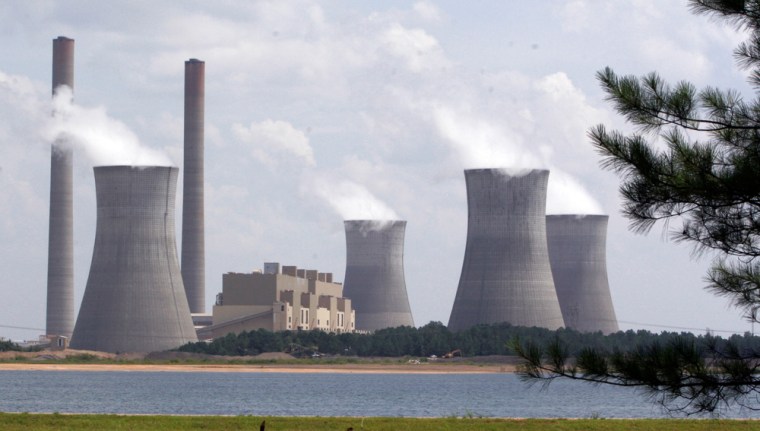From higher electric bills to more expensive gasoline, the possible economic cost of tackling global warming is driving the debate as climate change takes center stage in Congress.
Legislation set for Senate debate Monday would require a reduction in carbon dioxide and other greenhouse gases from power plants, refineries, factories and transportation. The goal is to cut heat-trapping pollution by two-thirds by midcentury.
With gasoline at $4 per gallon and home heating and cooling costs soaring, it is getting harder to sell a bill that would transform the country's energy industries and — as critics will argue — cause energy prices to rise even more.
Sen. Joe Lieberman, the Connecticut independent who is a leading sponsor of the bill, says computer studies suggest a modest impact on energy costs, with several projections for continued economic growth. Sponsors says the bill also offers billions of dollars in tax breaks to offset higher energy bills.
Lawmakers returning from the Memorial Day break have more than just energy legislation to work on:
- Through a printing error, a 34-page section of a $290 billion farm bill did not make it into the final version that became law. Senators now must deal with the missing section on trade and international food.
- The House and Senate are going back and forth over spending for the Iraq war, college benefits for veterans and New Orleans' levees.
The debate on global warming is viewed as a watershed in climate change politics. Yet both sides acknowledge the prospects for passage are slim this election year.
Several GOP senators are promising a filibuster; the bill's supporters are expressing doubt they can find the 60 votes to overcome the delaying tactic.
Sharp divide among lawmakers
Only a few senators now dispute global warming. Still, there is a sharp divide over how to lessen the country's heavy dependence on coal, oil and natural gas without passing along substantially higher energy costs to people.
The petroleum industry, manufacturers and business groups have presented study after study, based on computer modeling, that they say bear out the massive cost and disruption of mandating lower carbon emissions.
Environmental groups counter with studies that show modest cost increases from the emission caps provide new incentives to develop alternative energy sources and promote energy efficiency and conservation.
"This debate is going to be mostly about costs," says Daniel Lashoff, director of the Climate Center at the Natural Resources Defense Council. "But we want to make sure in that debate we don't forget that the cost of inaction on global warming would be much higher than the cost of the emission reductions called for in this bill."
The proposal would cap carbon dioxide releases at 2005 levels by 2012. Additional reductions would follow annually so that by 2050, total U.S. greenhouse emissions would be about one-third of current levels.
The bill would create a pollution allowance trading system. That would generate billions of dollars a year to help people offset expected higher energy costs, promote low-carbon energy alternatives and help industries deal with the transition. Part of the $6.7 trillion projected to be collected from the allowances over 40 years would go toward $800 billion in tax breaks to offset people's higher energy costs.
These reductions "will not only enable us to avoid the ravages of unchecked global warming, but will create millions of new jobs," contends Democratic Sen. Barbara Boxer of California, who heads the Senate Environment and Public Works Committee.
Some believe bill goes too far
The legislation is not as strong as some Democrats, including presidential candidates Barack Obama and Hillary Rodham Clinton, would like. They want cuts in CO2 emissions of 80 percent by 2050.
Others lawmakers believe the bill goes too far, too fast. They fear it will outpace development of the technology needed to make the shift from fossil fuels, causing energy prices to soar.
Sen. John McCain of Arizona, the likely GOP presidential nominee, recently announced a less ambitious plan to cut greenhouse emissions 60 percent by 2050. He has not said whether he will support the Senate bill, although he favors a cap-and-trade approach.
A separate GOP proposal, from Sen. George Voinovich of Ohio, would set milestones for carbon dioxide reductions over the next 20 years. It would allow for mandates after that time once a clearer picture develops about new, low-carbon energy technologies.
Senators advocating aggressive action on climate change say that would be too late to avert the worst effects of global warming.
Also in dispute is the distribution of pollution allowances. Many Democrats, including Clinton and Obama, want to auction all allowances. The Senate bill would give about half of them to states, municipalities and affected industries.
Sen. Bernie Sanders, an independent from Vermont, said he will try to get that changed so that none goes to what he considers to be special interests.
Sen. Bob Corker, R-Tenn., also wants most, if not all, the allowances auctioned and the money going out in checks to anyone earning $150,000 or less, or $300,000 for couples.
